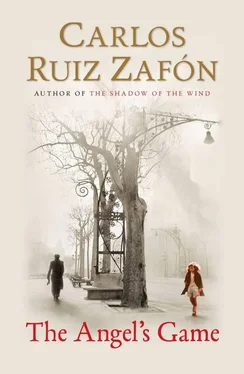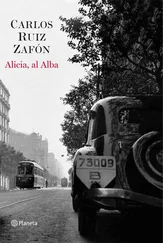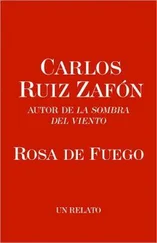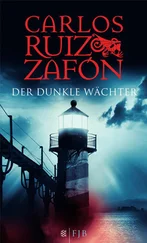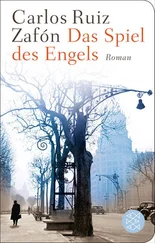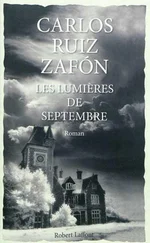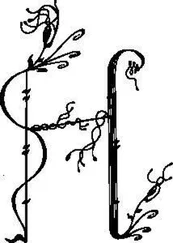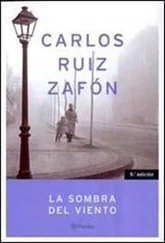‘Martín, my friend, circumstances have conspired so that not one of the champions on our payroll is on the premises or can be contacted in due time. With disaster imminent, I have decided to give you your first crack at glory.’
‘You can count on me.’
‘I’m counting on five double-spaced pages in six hours’ time, Don Edgar Allan Poe. Bring me a story, not a speech. If I want a sermon, I’ll go to Midnight Mass. Bring me a story I have not read before, and if I have read it, bring it to me so well written and narrated that I won’t even notice.’
I was about to leave the room when Don Basilio got up, walked round his desk and rested a hand, heavy and large as an anvil, on my shoulder. Only then, when I saw him close up, did I notice a twinkle in his eyes.
‘If the story is decent I’ll pay you ten pesetas. And if it’s better than decent and our readers like it, I’ll publish more.’
‘Any specific instructions, Don Basilio?’ I asked.
‘Yes: don’t let me down.’
I spent the next six hours in a trance. I installed myself at a table that stood in the middle of the editorial room and was reserved for Vidal, on the days when he felt like dropping by. The room was deserted, submerged in a gloom thick with the smoke of a thousand cigarettes. Closing my eyes for a moment, I conjured up an image, a cloak of dark clouds spilling down over the city in the rain, a man walking under cover of shadows with blood on his hands and a secret in his eyes. I didn’t know who he was or what he was fleeing from, but during the next six hours he was going to become my best friend. I slid a page into the typewriter and, without pausing, I proceeded to squeeze out everything I had inside me. I quarrelled with every word, every phrase and expression, every image and letter as if they were the last I was ever going to write. I wrote and rewrote every line as if my life depended on it, and then rewrote it again. My only company was the incessant clacking of the typewriter echoing in the darkened hall and the large clock on the wall exhausting the minutes left until dawn.
Shortly before six o’clock in the morning I pulled the last sheet out of the typewriter and sighed, utterly drained. My brain felt like a wasps’ nest. I heard the slow, heavy footsteps of Don Basilio, who had emerged from one of his controlled naps and was approaching unhurriedly. I gathered up the pages and handed them to him, not daring to meet his gaze. Don Basilio sat down at the next table and turned on the lamp. His eyes skimmed the text, betraying no emotion. Then he rested his cigar on the end of the table for a moment, glared at me and read out the first line:
‘Night falls on the city and the streets carry the scent of gunpowder like the breath of a curse.’
Don Basilio looked at me out of the corner of his eye and I hid behind a smile that didn’t leave a single tooth uncovered. Without saying another word, he got up and left with my story in his hands. I saw him walking towards his office and closing the door behind him. I stood there, petrified, not knowing whether to run away or await the death sentence. Ten minutes later – it felt more like ten years to me – the door of the deputy editor’s office opened and the voice of Don Basilio thundered right across the department.
‘Martín. In here. Now.’
I dragged myself across as slowly as I could, shrinking a centimetre or two with every step, until I had no alternative but to show my face and look up. Don Basilio, the fearful red pencil in hand, was staring at me icily. I tried to swallow, but my mouth was dry. He picked up the pages and gave them back to me. I took them and turned to go as quickly as I could, telling myself that there would always be room for another shoeshine boy in the lobby of the Hotel Colón.
‘Take this down to the composing room and have them set it,’ said the voice behind me.
I turned round, thinking I was the object of some cruel joke. Don Basilio pulled open the drawer of his desk, counted ten pesetas and put them on the table.
‘This belongs to you. I suggest you buy yourself a better suit with it – I’ve seen you wearing the same one for four years and it’s still about six sizes too big. Why don’t you pay a visit to Señor Pantaleoni at his shop in Calle Escudellers? Tell him I sent you. He’ll look after you.’
‘Thank you so much, Don Basilio. That’s what I’ll do.’
‘And start thinking about another of these stories for me. I’ll give you a week for the next one. But don’t fall asleep. And let’s see if we can have a lower body count this time – today’s readers like a slushy ending in which the greatness of the human spirit triumphs over adversity, that sort of rubbish.’
‘Yes, Don Basilio.’
The deputy editor nodded and held out his hand to me. I shook it.
‘Good work, Martín. On Monday I want to see you at the desk that belonged to Junceda. It’s yours now. I’m putting you on the crime beat.’
‘I won’t fail you, Don Basilio.’
‘No, you won’t fail me. You’ll just cast me aside sooner or later. And you’ll be right to do so, because you’re not a journalist and you never will be. But you’re not a crime novelist yet, even if you think you are. Stick around for a while and we’ll teach you a thing or two that will always come in handy.’
At that moment, my guard down, I was so overwhelmed by a feeling of gratitude that I wanted to hug that great bulk of a man. Don Basilio, his fierce mask back in place, gave me a steely look and pointed towards the door.
‘No scenes, please. Close the door. And happy Christmas.’
‘Happy Christmas.’
The following Monday, when I arrived at the editorial room ready to sit at my own desk for the very first time, I found a coarse grey envelope with a ribbon and my name on it in the same recognisable font that I had been typing out for years. I opened it. Inside was a framed copy of my story from the back page of the Sunday edition, with a note saying:
‘This is just the beginning. In ten years I’ll be the apprentice and you’ll be the teacher. Your friend and colleague, Pedro Vidal.’
My literary debut survived its baptism of fire, and Don Basilio, true to his word, offered me the opportunity to publish a few more stories in a similar style. Soon the management decided that my meteoric career would have a weekly outlet as long as I continued to perform my duties in the editorial room for the same price. Driven by vanity and exhaustion, I spent the days going over my colleagues’ stories and churning out countless reports about local news and lurid horrors, so that later I could spend my nights alone in the office writing a serialised work that I had been toying with in my imagination for a long time. Entitled The Mysteries of Barcelona, this Byzantine melodrama was a farrago shamelessly borrowed from Dumas and Stoker, taking in Sue and Féval along the way. I slept about three hours a night and looked like I’d spent those inside a coffin. Vidal, who had never known that kind of hunger which has nothing to do with the stomach though it gnaws at one’s insides, was of the opinion that I was burning up my brain and that, at the rate I was going, I would be celebrating my own funeral before I reached twenty. Don Basilio, who was unmoved by my diligence, had other reservations. He published each of my chapters reluctantly, annoyed by what he considered to be an excess of morbidity and an unfortunate waste of my talent at the service of plots and stories of dubious taste.
The Mysteries of Barcelona gave birth to a fictional starlet in instalments, a heroine I had imagined as one can only imagine a femme fatale at the ripe age of seventeen. Chloé Permanyer was the dark princess of all vamps. Beyond intelligent, and even more devious, always clad in fine lingerie, she was the lover and evil accomplice of the mysterious Baltasar Morel, king of the underworld, who lived in a subterranean mansion peopled by automatons and macabre relics with a secret entrance through tunnels buried under the catacombs of the Gothic quarter. Chloé’s favourite way of finishing off her victims was to seduce them with a hypnotic dance during which she removed her clothes, then kiss them with a poisoned lipstick that paralysed all their muscles and made them die from silent suffocation as she looked into their eyes, having previously drunk an antidote mixed in a fine-vintage Dom Pérignon. Chloé and Baltasar had their own code of honour: they killed only the dregs of society, cleansing the globe of bullies, swines, fanatics and morons who made this world unnecessarily miserable for the rest of mankind in the name of flags, gods, tongues, races and other such rubbish in order to serve their own greed and meanness. For me Chloé and Baltasar were rebellious heroes, like all true heroes. For Don Basilio, whose literary tastes had settled in the Spanish verse of the Golden Age, it was all a monstrous lunacy, but in view of the favourable reception my stories enjoyed and the affection which, despite himself, he felt towards me, he tolerated my extravagances and attributed them to an excess of youthful ardour.
Читать дальше
